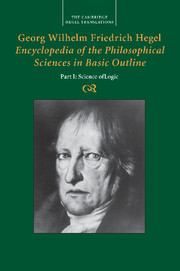 Georg Wilhelm Friedrich Hegel: Encyclopedia of the Philosophical Sciences in Basic Outline
Georg Wilhelm Friedrich Hegel: Encyclopedia of the Philosophical Sciences in Basic Outline Book contents
- Frontmatter
- Contents
- Acknowledgments
- Introduction: Hegel’s Encyclopedia Logic
- Translators’ Note
- Encyclopedia of the Philosophical Sciences in Basic Outline, Part I: Science of Logic
- Part I Science of Logic §§ 19–244
- Bibliography
- Glossary of Translated Terms, German to English
- Glossary of Translated Terms, English to German
- Index
Foreword to the Third Edition
Published online by Cambridge University Press: 30 September 2021
- Frontmatter
- Contents
- Acknowledgments
- Introduction: Hegel’s Encyclopedia Logic
- Translators’ Note
- Encyclopedia of the Philosophical Sciences in Basic Outline, Part I: Science of Logic
- Part I Science of Logic §§ 19–244
- Bibliography
- Glossary of Translated Terms, German to English
- Glossary of Translated Terms, English to German
- Index
Summary
In this third edition, various improvements have been made here and there. Particular care has been taken to enhance the clarity and exactness of the exposition. However, in keeping with a course book's purpose of serving as a compendium, the style had to stay condensed, formal and abstract. The book retains its function of receiving the requisite explanations only through the oral presentation.
Since the second edition, several evaluations of my philosophy have appeared that have for the most part shown little aptness for such business. Such careless responses to works that have been thought and worked through for many years with all the seriousness of the object and its scientific requirements are unseemly and unpleasant when one sees the nasty passions of conceit, haughtiness, envy, mockery, and so on, that emerge from those responses; even less is there anything in them that might be instructive. Cicero says in Tusculanae disputationes 1. II [4]: ‘Est philosophia paucis contenta judicibus, multitudinem consulto ipsa fugiens, eique ipsi et invisa et suspecta; ut, si quis universam velit vituperare, secundo id populo facere possit.’ [Philosophy is content with but a few judges and flees from the multitude deliberately, while they are themselves both suspect to and hated by themultitude; so that, if someone wanted to chide it as a whole, he could do so with the support of the people.] Themore limited the insight and thoroughness, themore popular it is to attack philosophy. A petty repulsive passion is palpable in the resonance it encounters in others, and ignorance accompanies it with the same sort of intelligibility. Other objects impress themselves upon the senses or stand before representation in all-embracing intuitions; one feels the need to have at least a slight degree of acquaintance with them in order to be able to converse about them; in addition, sound common sense [Menschenverstand ] finds it easier to recall them since they are situated in a familiar, firm presence. But the lack of all this [i.e., all these features of other objects] unleashes itself unabashedly against philosophy, or rather against some imaginary empty picture of it that ignorance fabricates and talks itself into.
- Type
- Chapter
- Information
- Georg Wilhelm Friedrich Hegel: Encyclopedia of the Philosophical Sciences in Basic OutlinePart I: Science of Logic, pp. 22 - 27Publisher: Cambridge University PressPrint publication year: 2010
